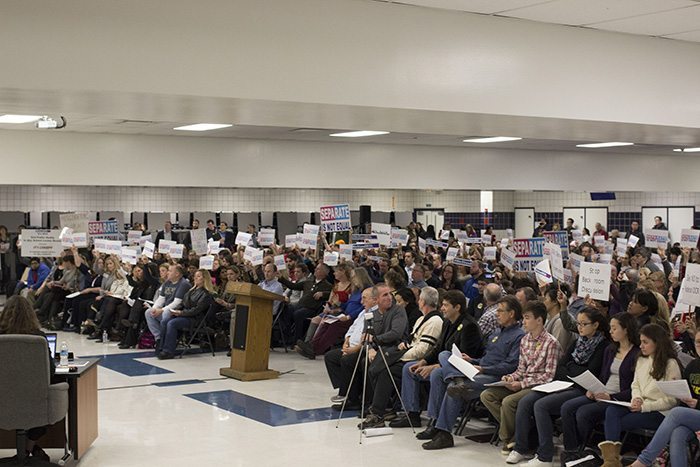Transgender Student Maintains Locker Room Access in Illinois District
Though the school district and the Department of Education reached a settlement, misunderstanding about the agreement led district officials to threaten to rescind it.

Days after a suburban Illinois school district reached a controversial agreement with the federal government about a transgender student’s locker room usage, school officials again heard arguments in a meeting to decide whether to rescind the settlement, ultimately keeping the agreement intact.
The board of Illinois’ Township High School District 211 decided to keep the agreement in place, as enforced by the Department of Education’s Office of Civil Rights (OCR), after hours of heated discussion between people who advocated for the transgender student to have access to the locker room of the gender with which she identifies and those who stood against the student’s rights.
Failure to comply with the agreement on a transgender student’s locker room access would result in the district losing $6 million in federal funds. The OCR’s finding that the district had violated Title IX in the case of a transgender student is the first of its kind.
OCR officials and District 211 last week reached an agreement, but it became clear that there was misunderstanding about the terms of the agreement. The district said that the agreement applied only to Student A, the transgender student who filed the complaint.
Student A identifies as female. She plays girls’ sports, uses the girls’ bathroom, and is recognized by the school as a girl, except when it comes to the locker room.
She filed a complaint in 2013 because she was forced to use a separate changing area for gym and sports. The school district this fall agreed to let her use the girls’ locker room, but only if she changed in a private changing area. Other girls would have the option of using private changing areas, though it would not be mandated. This was another point of confusion about Friday’s agreement.
District officials said that they interpreted the agreement to mean that Student A must change in the private changing area. The ACLU, which represents Student A and her family, said that though their client wants to change in a private changing area, she is not forced to do so based on the agreement. They maintain that the agreement applies district-wide and not just to Student A.
The measure in the agreement reads:
Based on Student A’s representation that she will change in private changing stations in the girls’ locker rooms, the District agrees to provide Student A access to locker room facilities designated for female students at school and to take steps to protect the privacy of its students by installing and maintaining sufficient privacy curtains (private changing stations) within the girls’ locker rooms to accommodate Student A and any students who wish to be assured of privacy while changing.
On Friday, Catherine E. Lhamon, the Department of Education’s assistant secretary for the Office for Civil Rights, spoke in favor of the ACLU, saying that district officials misspoke by indicating the agreement pertains to one student and that the student’s use of the locker room is contingent only upon her use of a separate changing area.
District Superintendent Daniel Cates released a statement saying that the district was “outraged” that the OCR misrepresented the agreement to the media and the public. The district then threatened to rescind the agreement, and an emergency meeting was held Monday to allow the public to voice their concerns before the school board voted.
Hours before the meeting, Lhamon sent a letter to the district’s lawyers that seemed to uphold the district’s interpretation of the agreement.
The full terms of the resolution of this investigation are set forth in the resolution agreement. As to the specific questions raised in your email, the agreement provisions specific to locker room access apply only to Student A and the District’s agreement to provide Student A access to the locker room is based on the student’s representation that she will change in private changing stations.
The school still heard testimony for two hours before holding a closed meeting to decide whether to keep the agreement in place. The school board announced a few hours later that since receiving the letter from the OCR, they have decided to keep the agreement in place.
“We are disappointed that the OCR made an already very difficult, passionate, and emotional issue very confusing with their apparent misstatements and lack of clarity in describing the agreement,” board president Mucia Burke said at the end of the meeting. “We are gratified, however, to receive the letter today that provides official clarity and removes any confusion surrounding the plan our Board approved early on December 3.”
The ACLU still maintains their view of the agreement, and told Rewire that the truth remains to be seen in the implementation.
“If you go back to November 2 and you look at the findings, they are incredibly powerful,” Ed Yohnka, director of communications and public policy at the ACLU, told Rewire. “Once you say that something is discrimination under Title IX, once you say that acting in this way is not consistent with federal law, it was never conceivable to us that the OCR would do something that would back away from that.”
Yohnka was referring to the OCR’s finding from their investigation of Student A’s claim, which states:
OCR finds by a preponderance of the evidence that the District is in violation of Title IX for excluding Student A from participation in and denying her the benefits of its education program, providing services to her in a different manner, subjecting her to different rules of behavior, and subjecting her to different treatment on the basis of sex.
Many from the district, including the group District 211 Parents for Privacy, oppose any compromise with the federal government, and believe the agreement should be rescinded regardless of its interpretation. The group believes that transgender students should not have any access to their gender-identified locker rooms or bathrooms.
The scene at James B. Conant High School in Hoffman Estates, Illinois, was tense and divided during the emergency meeting held Monday night to discuss the agreement between the OCR and Township School District 211. On one side, a vocal group held white signs that read “No Deal with the OCR” and “Go to Court.”
That group sometimes booed their opposition, yelling at speakers to step away from the podium.

One man was expelled from the meeting when he yelled out of turn about how people from outside the district were not representative of the majority of District 211 families. As he was escorted out of the building by law enforcement, people standing on the sides of the packed auditorium wearing “Protect All Students” stickers cheered and clapped for him.
For the rest of the meeting, when someone spoke up in support of the agreement and Student A, shouts came from the back of the auditorium calling, “What district are you from?” and, “Sit down, these aren’t your children.”
Forty-two of the 150 people who drew numbers to speak were heard in the two hours allotted for open discourse. Many of the 600 people who attended the meeting were from outside the school district, there to show support for Student A. One of those supporters was Desiree Galeski, a transgender student at the University of Illinois at Chicago, who was the sixth speaker of the night.
Galeski, an athlete, urged the school board not to misgender Student A.
A group of women wearing “Protect ALL Students” stickers laughed when Galeski said that she thought some day sports wouldn’t be gendered. Many who were there to oppose any agreement with the OCR were vocal about the fact that they believed outside voices and the media were portraying them as bullies.
Some teenage girls from the high school spoke publicly about how they would feel uncomfortable changing in the same dressing room as Student A, and said that they spoke for many students who were afraid to speak up for fear of being labeled as discriminatory. Many of those from outside the district expressed the importance of their presence to show support for Student A, who has not spoken publicly in an attempt to protect her privacy.
“I’m here because she deserves so much more,” Galeski told Rewire.
Some people on both sides of the aisle expressed disappointment with how the district has handled the situation, and the fact that the case has thrust the school into the national spotlight. Many of the speakers, however, welcomed outside voices and advocacy groups, because any decision regarding the matter is nationally significant.
While the nation looks on as the district debates and protests, some pointed out that at the heart of the issue is a teenager who wants to be treated like everyone else.
“I talked last night to the student and she said that this is the kind of thing that brings out the best and the worst in people,” Yohnka told Rewire. “She never wanted this. The district went public, not us, not the family. They wanted to resolve it privately and they just weren’t given that opportunity without going through all this. All they can do now is hope that we can come to a resolution that is good for everyone.”
